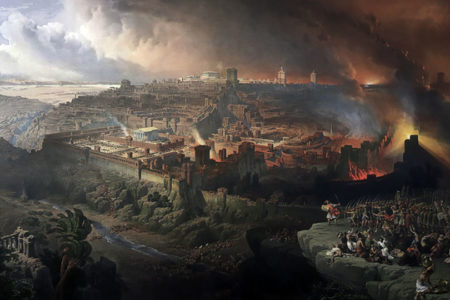A Window in Sudan
The clamor for a Palestinian state on the West Bank in Israel continues to rise. It is now an established perception in the West, particularly in the media, that the Israeli-Palestinian Peace Accord was the first step toward Palestinian statehood. Indeed, Yasser Arafat, having fudged on essential elements of the accord he agreed to before the much-ballyhooed handshake in Washington, is negotiating as if he is a preordained monarch haggling over borders of his Promised Land.
But before we accept the notion that Palestinian statehood will provide a “solution” to the problems between Israelis and their neighbors, we had better think again. The serious doubt currently rising regarding Yasser Arafat’s ability to control radical Islamic fundamentalists in Gaza and on the West Bank is an issue that cannot be minimized or ignored. Indeed, the call to create a Palestinian state and hope for the best is not a rational option when the future stability of Israel is at stake. Without question, a future Palestinian state will immediately face intense pressure from Islamic fundamentalists, who will attempt to seize control of the government. As a matter of fact, control of a Palestinian state within the State of Israel must be ranked as a number one priority on the fundamentalist Islamic agenda worldwide. And, should Jihad (holy war)-driven coalitions led by fanatics like Hamas and Islamic Jihad take power through Palestinian “free elections,” the world will be forced to stand aside while Islamization of the citizenry takes place. If this should occur, there will, in actuality, be no Palestinian state or, we might even say, Arab state. It will be an Islamic state, and it is imperative that we understand the difference.
For those who care to look, an open window to the Islamization process is present not far from Israel. That window is in Sudan, which, for those not acquainted with the geography of the region, touches the Red Sea south of Egypt and Libya. Sudan is led by a military dictatorship currently headed by Lt. General Omar al Bashir. In 1983 a predecessor of Bashir, Col. Gaafar Muhammad Nimeiri, as part of an Islamization campaign, announced his decision to incorporate traditional Islamic law, Shari’a, into the penal code. Opting to make Shari’a, with its brutal forms of punishment (such as amputation and public lashings), the official law of the land was controversial even among some more moderate Muslim groups. Christians, animists, and other non-Muslims in the south of the country were subjected to the newly incorporated Islamic laws, a condition that fueled strife between elements in southern Sudan who resented domination by the increasingly repressive Arab regimes in Khartoum, the capital. On June 30, 1989, military officers under then Col. Omar al Bashir took over the government through a coup and, in league with the National Islamic Front, intensified the program of Islamization.
With financial and military aid from Libya, Iraq, Iran, and other Islamic extremists, Bashir’s government targeted Christians and animists for assimilation or annihilation in its quest for a pure Islamic state. Accordingly, Sudan’s leadership has pursued an avowed policy of organizing the country by making Arabic the national language, Islam the national religion, and Shari’a (Islamic law) the national law. The chilling results are well documented by the U.S. State Department, a host of human rights agencies, and other reliable individuals and organizations. Although there is no question about what is occurring, there are very serious questions as to why the international media have all but ignored the tragedy of Sudan when a steady stream of grisly reports has come out of the country.
Middle East Concern identified the fundamental issues in conflict. “Jihad [Islamic holy war] represents a collision of two cultures. Its aim is to supplant the indigenous Christian, and animist religions (both predate Islam in Sudan) with the unifying force of Islam.” Middle East Concern quotes a reliable Christian commentator, who says, “The current suffering will continue at the hands of this and future regimes until the south submits to Islam. There will be no peace otherwise.” The suffering to which the commentator refers is severe even when compared with the often-reported tragic situations witnessed in Bosnia and Somalia. Charred evidence of the Islamic crusade against Christians can be viewed in the villages and churches put to the torch by government troops. According to the human rights group Africa Watch, in camps housing displaced Christians from the south near the capital city of Khartoum, more than 30 churches were closed by Muslim authorities by 1990.
Sudan Democratic Gazette reports: “An authoritative study commissioned by United States Committee for Refugees, has revealed that 1.3 million Southern Sudanese have died since May 1983 … The report concludes that its estimate of 1.3 million deaths is conservative—as many as 2 million may have died.” The Gazette further states that 30 percent of Southern Sudan’s five million population have been displaced since 1983.
Barbara Baker of News Network International cites United Nations Human Rights Commission accusations against the government of Sudan at a meeting in Geneva. “Lt. General Omar al Bashir’s government was specifically accused of promoting ethnic-religious ‘cleansing’ of mainly Christian and animist Africans, forcing Islamic law on its non-Muslim citizens and pressuring displaced Sudanese to convert to Islam in exchange for food and relief aid.”
A survey by the Centers for Disease Control in March 1993 concluded that while 80 percent of the children in many areas were malnourished, 44 percent of children surveyed were “critically undernourished,” and rates of severe undernutrition were “among the highest ever documented, including Somalia.”
Among the most gruesome revelations of torture, systematic starvation, rapes, beatings, and assorted forms of brutality against Christians and other non-Muslims are summary crucifixions. Typical of these allegations is one by Middle East Concern that torture used against Nubian Christian leaders, especially pastors and evangelists, includes inverted crucifixion. These crucifixions are described as suspension by the feet with arms outstretched, sometimes over fire. Jubilee Campaign, a Christian human rights organization supported by 100 members of Parliament in Great Britain, leveled similar accusations: “In Sudan the civil war has led to a genocidal reign of terror directed against the Christian south by the Islamic regime in Khartoum with mounting evidence of the crucifixion of the male population of whole villages by government troops.”
As one might expect, conversion to Islam brings an immediate cessation of torture plus pardon for past “crimes.” Food is often used as an incentive to convince “infidels” to convert. There is documentation that relief workers from outside the country have been forbidden entry into camps where displaced people from the south are kept. Furthermore, their relief supplies, confiscated by the government, have been distributed by Muslim agencies as an inducement for conversion to Islam. A U.S. State Department report issued in May 1993 articulates the problem: “There are reports that thousands died of starvation in Hiram displaced camp last year, while local authorities would not release donated relief food.” Middle East Concern asserts that non-Muslims must adopt Islam in order to qualify for food. According to Middle East Concern, the practice has been “unequivocally confirmed by multiple sources.”
Unfortunately, children are not immune to the atrocities afflicting non-Muslims in Sudan. According to the May 1993 State Department report, “Credible sources say GOS [government of Sudan] forces … routinely steal women and children in the Bahr El Ghazl. Some women and girls are kept as wives; the others are shipped north where they perform forced labor on Kordofan farms or are exported, notably to Libya.” That children are a part of Sudanese slave trading is alleged by Bishop Gassis of El Obeid in Northern Sudan: “More than 20,000 Nuba children have been sold into slavery with the fullest knowledge and connivance of the regime.” According to Bishop Gassis’ report, “Sudan is forcing [such] non-Muslim boys and girls displaced by war and exile into slavery, first subjecting the boys to circumcision and girls to ‘excision’ so they could be dispersed into villages as ‘Muslim children.’”
Recently Bashir’s government has been attempting to put a better face on what the U.S. State Department terms the “Arabization and Islamization drive,” incorporating “accelerated religious persecution of non-Muslims.” The impetus for the effort was identified by Hubert Barbier, spokesman for International Fellowship of Reconciliation, as reported by Randy Tift of News Network International. Barbier contends that Sudan was “afraid of new condemnation and, since Western armies came to Somalia and Iraq, [it is] afraid that the next country [to be entered by troops] may be Sudan.” Tift adds, “Other U.N. observers agreed that official Sudanese perception of a possible Western military response to secure relief aid or human rights may play heavily on the thinking of Sudan’s leaders.”
There will be those, of course, who counter such somber reports and warnings by contending that Sudan may be a political mutation and not the norm in the Arab world. And, lest we raise the ire of Arab regimes we wish to cooperate with, perhaps it is best not to delve into the dark side of Sudan. The fact is, however, that Arab states willing to live in peace with Israel and the Western world are as much at risk—perhaps even more so—than the rest of us. Sudan, like Iran, is controlled by Islamic fundamentalists. Their frenzied political-religious credo embraces the fanaticism displayed by the family and friends of Anwar Aziz, a Palestinian suicide bomber who vaporized his body while attempting to ram a car laden with explosives into an Israeli patrol outside the Gaza city limits. Aziz and his cohorts in Islamic Jihad were using the act to protest the peace process. After his death, the bomber’s family and friends erected a tent for week-long mourning ceremonies. A red-lettered banner on the tent read: “LET SLAUGHTERING THE JEWS BE OUR ROAD TO PARADISE.” Along that “road to paradise” are the remains of many who stood in the way of the fundamentalist Islamic dream—a world ruled by Shari’a (Islamic law) and peace maintained by Jihad (holy war).
Let it be said unequivocally: When it comes to Christians, Jews, and Muslims (remember Anwar Sadat) who disagree with their agenda, there are no benevolent fundamentalist Islamic regimes. You’ll find the proof by looking through the window that is open in Sudan. And before it is too late, we had all better take a good look and pay attention to what we see.








